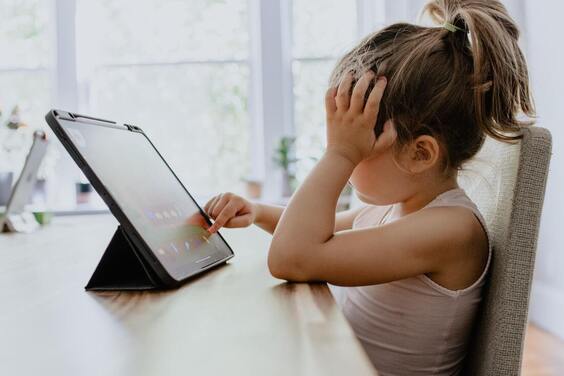so, how is it going so far?
We have been hearing a lot from distance learners and parents of distance learners and the main thing we are hearing is: frustration!
A few kids seem to like online learning if they are provided with work and they can do it at their own pace. This is great. Unfortunately they do not seem to be in the majority. Most people are really, really frustrated.
Sometimes when things aren't working the best course of action is to step back, pause, think about what really matters, and make a new plan that focuses on that. In all likelihood, and no matter what age your kids are, what really matters as far as this school year is nurturing wellbeing and the love of learning.
Let's start with these three priorities:
A few kids seem to like online learning if they are provided with work and they can do it at their own pace. This is great. Unfortunately they do not seem to be in the majority. Most people are really, really frustrated.
Sometimes when things aren't working the best course of action is to step back, pause, think about what really matters, and make a new plan that focuses on that. In all likelihood, and no matter what age your kids are, what really matters as far as this school year is nurturing wellbeing and the love of learning.
Let's start with these three priorities:
* LESS STRESs
If your kids are struggling and you are concerned about their wellbeing, take the pressure off. All elementary kids are moved to the next grade by age. Being held back a year no longer happens. High school is based on credits and, yes, a credit can be failed. It can also be made up. The only marks that count for university entrance are grade 11 and 12. Low marks can be raised with online courses, taking Open University courses, or summer school. Taking a year or two off to work, volunteer, or follow a passion and applying for university as a mature student is a great option and has the side benefit of producing students who are more socially and emotionally prepared university. Find out more about high school and post-secondary options, here.
* MORE CONSENt

As adults we are almost never forced to learn something. Yet we learn new things all the time by reading, taking courses, trying a new activity or sport, and working to get better at something. We do this because we want to. We choose it. Interest and consent are incredibly important in learning and yet they are considerations we seldom give to our children. Watch this short but powerful video on Consent In Education by Blake Bowls.
Here is something we think will help: it is ok to say to the school, 'no thank you.'
You have a right to customize your child's online learning in a way that works. That means you can say 'no thank you' to having your 5 or 6 year old sit in front of the computer for 180 minutes per day. Children learn through play; running around in the backyard, making a fort out of blankets, turning a milk carton into a monster, collecting leaves on a walk and then getting your help to look them up on the internet. Play learning. Learning play.
It is also ok to say to your older kids, "this year take the classes you are getting something out of and skip the rest. Spend the extra time doing something that interests you." You might be very pleasantly surprised at the results. When we trust kids, they become trustworthy.
Here is an analogy that might help. Try viewing school more like a restaurant. In a restaurant your kids don’t need to eat everything on the menu, they can pick and choose, depending on their taste. And if they really want something that isn't on the menu, they can go get it somewhere else. Try that this year with online schooling. Take what works, leave what doesn't and explore other options to learn via curiosity and passion.
Here is something we think will help: it is ok to say to the school, 'no thank you.'
You have a right to customize your child's online learning in a way that works. That means you can say 'no thank you' to having your 5 or 6 year old sit in front of the computer for 180 minutes per day. Children learn through play; running around in the backyard, making a fort out of blankets, turning a milk carton into a monster, collecting leaves on a walk and then getting your help to look them up on the internet. Play learning. Learning play.
It is also ok to say to your older kids, "this year take the classes you are getting something out of and skip the rest. Spend the extra time doing something that interests you." You might be very pleasantly surprised at the results. When we trust kids, they become trustworthy.
Here is an analogy that might help. Try viewing school more like a restaurant. In a restaurant your kids don’t need to eat everything on the menu, they can pick and choose, depending on their taste. And if they really want something that isn't on the menu, they can go get it somewhere else. Try that this year with online schooling. Take what works, leave what doesn't and explore other options to learn via curiosity and passion.
* MORE RESPONSIBILITY
Every parent and every teacher want students to take more responsibility for becoming educated. At least that is the party line. But if we want kids to 'own' becoming educated, we need to let them make choices so that they can take responsibility for them. You can't take responsibility for someone else's choice, only your own. To get a glimpse of what is possible when it is clear to kids that becoming educated is 'their job', check out these videos on student agency.
and now mum and daD, what about you?
Maybe now that school has been thrust into your home, it might be a good time to learn something about learning, how it happens, what helps and what hinders it. There is no use in standing in the doorway and making sure your kids are doing their remote learning, if you aren't really sure that what they are being made to do makes sense. School Transformation, by master educator Wayne Jennings, is a great place to start on your own journey to learn more about how we learn. Here is Chapter 5, How Students Learn (in both text and audio). It provides an easy-to-digest synthesis of the current research on brain function, psychology, and child development as it relates to learning. Thank you, Wayne.


